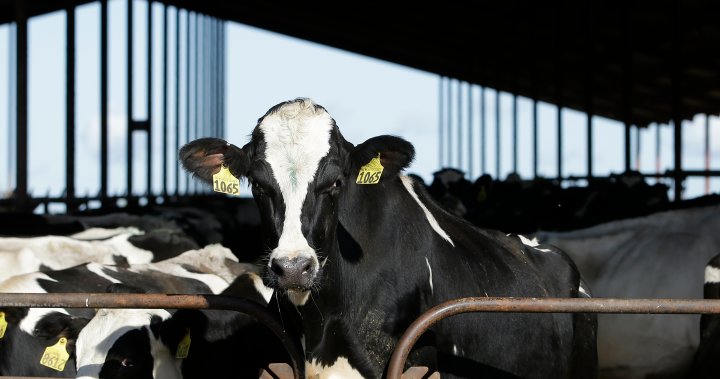WARNING: This story contains distressing details
In 1923, a young boy named Edward wrote his parents about what it was like being a student at the St. Barnabas Indian Residential School in Onion Lake, Sask.
“I am always hungry,” he shared in a letter quoted many decades later in the 2015 findings of the Truth and Reconciliation Commission of Canada (TRC). “We only get two slices of bread and one plate porridge. Seven children ran away because [they] are hungry.”
St. Barnabas burned to the ground in 1943. Another residential school, St. Anthony’s, operated in Onion Lake until 1974.
Today, work being done at the school sites — located about 50 kilometres north of Lloydminster, which borders Saskatchewan and Alberta — is dredging up painful memories.
The Onion Lake Cree Nation began searching for unmarked graves using ground-penetrating radar equipment last week, becoming the fifth Saskatchewan First Nation to say it has undertaken that difficult task in recent months.
“It’s been quite an experience, bringing back the memories, opening up old wounds from the past,” said Chief Henry Lewis who attended St. Anthony’s until he left as 15-year-old in 1969.
The TRC found that 4,100 named and unnamed students died in residential schools across Canada, and that many were likely buried in unmarked and untended graves at school or school-related cemeteries.
Murray Sinclair, the former chair of the commission, has said as many as 25,000 children may have died at the schools.

St. Barnabas, which was operated by the Anglican Church, is the first site being searched in Onion Lake. The First Nation is also planning work at the site of St. Anthony’s, which was operated by the Catholic Church.
“I believe that there would be some [other] site locations identified by elders where they recommended a search to be conducted,” Lewis said.
A message posted on the First Nation’s Facebook page last Thursday encouraged people who are triggered by the process to call the residential school crisis line (1-866-925-4419) or Onion Lake’s healing and wellness centre.
“This is a hard day, but a healing day too,” the post said.
Parents resisted school officials
Major Christian denominations operated approximately 20 federally funded residential schools in Saskatchewan beginning in the late 19th century. After being separated from their communities and families, children were subjected to various forms of neglect and abuse.
Parents resisted their children being sent to St. Barnabas and St. Anthony’s, the TRC reported in one of its six volumes of findings.
The commission cited a 1906 letter in which the principal of St. Barnabas complained the school was “entirely powerless in the matter of persuading or forcing the parents to send their children to school. [They] either simply laugh or point blank refuse or in some instances take the children away or coax them to run away after they have been in the school for some time.”
- Do you know of a child who never came home from residential school? Or someone who worked at one? We would like to hear from you. Email our Indigenous-led team investigating the impacts of residential schools at [email protected] or call toll-free: 1-833-824-0800
When two boys ran away from St. Barnabas in 1941, they were located and returned to the school by the RCMP.
St. Barnabas survivor Ula Hotonami testified to the commission that she was strapped by a laundry superintendent for joking with a student in the hallway.
Most elders who attended St. Barnabas have died, Chief Lewis said.

Survivor Shirley Waskewitch testified to the commission that, while a student at St. Anthony’s, she developed scabs all over her body and was exposed to the other girls by a nun.
Principals at some residential schools extended their power over the personal lives of Indigenous people by arranging marriages, including at St. Anthony’s, the commission wrote.
“In 1936, the principal prepared a list of students who had turned sixteen who, he believed, should not be discharged,” the commission wrote. “He insisted on keeping the students since he would ‘always try to marry them as soon as they leave the school.'”
Other First Nations in Sask. undertake searches
Onion Lake Cree Nation is just the latest Saskatchewan Indigenous community to begin searching for unmarked residential school graves since B.C.’s Tk’emlúps te Secwépemc First Nation reported the discovery of a burial site adjacent to the former Kamloops Indian Residential School in late May.
The Lac La Ronge Indian Band in north-central Saskatchewan recently began searching for unmarked graves associated with the Lac La Ronge Indian Residential School in La Ronge, Sask.
The seven First Nations that make up Battlefords Agency Tribal Chiefs have not yet announced results from their recent work in Delmas, where the Delmas Indian Residential School once stood.
Muskowekwan First Nation has said it had found what it estimates to be the remains of 35 previously unidentified students. More work is planned at the Muscowequan residential school site this summer.
Cowessess First Nation announced a preliminary finding of 751 unmarked graves at a cemetery near the former Marieval Indian Residential School — the largest such discovery in Canada to date.
Support is available for anyone affected by their experience at residential schools, and those who are triggered by the latest reports.
A national Indian Residential School Crisis Line has been set up to provide support for former students and those affected. People can access emotional and crisis referral services by calling the 24-hour national crisis line: 1-866-925-4419.
Do you have information about unmarked graves, children who never came home or residential school staff and operations? Email your tips to CBC’s new Indigenous-led team investigating residential schools: [email protected].





More Stories
Luxury retailer Ted Baker Canada is seeking creditor protection | CBC News
King Charles set to resume public duties after stepping away for cancer treatment | CBC News
Winnipeg father guilty of manslaughter after shaking, hitting or throwing infant son in 2020: judge | CBC News